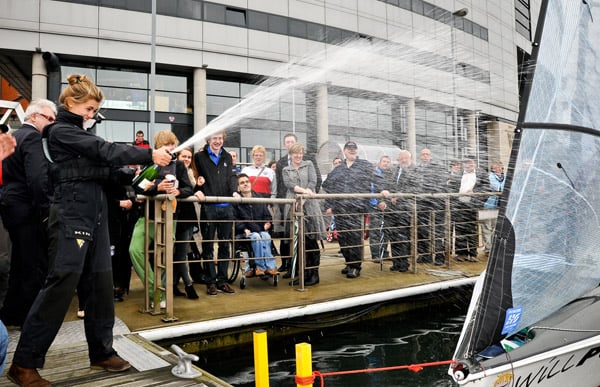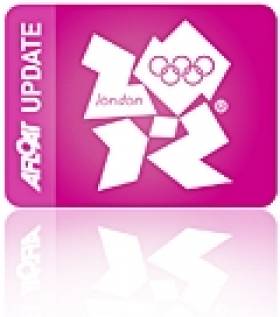Displaying items by tag: Steve Frecknell
Belfast Olympic Hope Presents £18,000 Boat to Charity
Twenty-year old sailor Tiffany Brien from Royal North of Ireland Yacht Club presented an £18,000 Paralympic sailing boat to local disabled charity Belfast Lough Sailability in Belfast Harbour today – the culmination of two years of fundraising by the 2012 Olympic hopeful.
The boat was officially launched today at Abercorn Basin, Titanic Quarter Belfast and was formally named 'Will Power' by Tiffany and Len O'Hagan, Chairman of Belfast Harbour. The significance of the name relates to a very close friend of Tiffany's, Will Doggart, who was paralysed last year following an accident. Will attended the launch today and has sailed in the new boat alongside Tiffany.
The 'Skud 18' sailing boat took two years to build in Australia and is the most high tech paralympic boat available. 'Will Power' is the first of its kind to arrive in Ireland and has already been committed to the goal of qualifying for the Irish Paralympic sailing team for the 2012 Paralympic Games - with local athlete Steve Frecknell hoping to compete for a medal. The boat will be the responsibility of Carrick based sailing charity Belfast Lough Sailability who will also use the boat to help disabled sailors to sail competitively in Northern Ireland.
Tiffany Brien began her fundraising campaign two years ago when she sailed 30 miles single-handedly across the Irish Sea from Portpatrick in Scotland to Belfast Lough raising a total of £18,400. Before launching the boat today she commented: "I am so excited to be sailing the new boat in Belfast Harbour today. It feels like I have been waiting for a long time for it to arrive. It is even more exciting that the Irish Paralympic sailing team has committed to using the new boat in their campaign for the 2012 Paralympic Games - fingers crossed it helps to bring a medal back."

Tiffany will also be hoping to bring an Olympic medal back to Northern Ireland as she is currently competing to represent Ireland in the Laser Radial Class at the 2012 Olympic Games.
Nigel Thompson, Chairman of Belfast Lough Sailability comments: "Everyone at Sailability is totally overcome with the sheer determination and generosity Tiffany has shown in her fundraising campaign. The arrival of the boat today is the culmination of the dedication and resolve demonstrated by this young lady when she sailed singled handedly across the Irish Sea. Not only will our Paralympic hopefuls benefit from this but many other disabled sailors in Northern Ireland will get to enjoy this exceptional boat - including Tiffany's friend Will, who hopes to become an active member of Sailability and a keen sailor. We would like to thank Tiffany sincerely and wish her the best of luck in her own Olympic campaign."
Belfast Lough Sailability is a "not for profit", volunteer-based charity which, through the activity of sailing, enriches the lives of people with any type of disability, the elderly, the financially and socially disadvantaged.
Belfast Harbour has been the principal sponsor of Tiffany's Sailability campaign. BTWCairns, Airtricity, Stena Line, Belfast Telegraph and Ulster Bank and Brook House Art & Design are associate sponsors.
























































